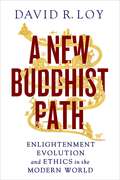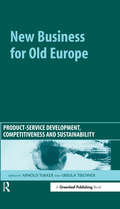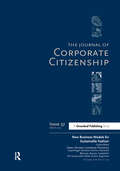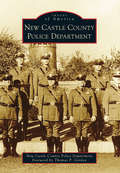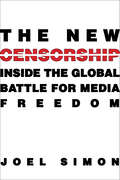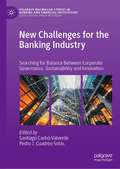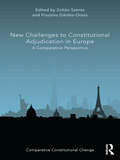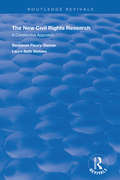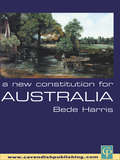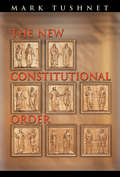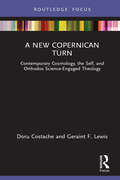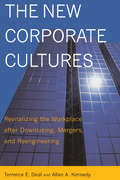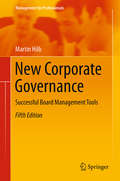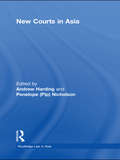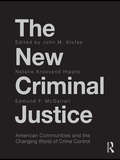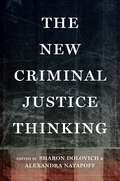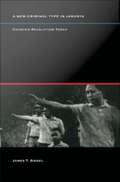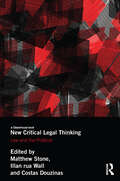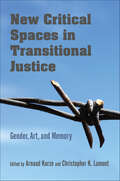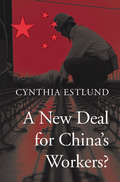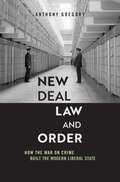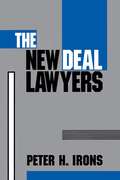- Table View
- List View
A New Buddhist Path
by David R. LoyEngage with a new vision of Buddhism and the modern world with the bestselling author of Money Sex War Karma: Notes for a Buddhist Revolution.David R. Loy addresses head-on the most pressing issues of Buddhist philosophy in our time. What is the meaning of enlightenment--is it an escape from the world, or is it a form of psychological healing? How can one reconcile modern scientific theory with ancient religious teachings? What is our role in the universe? Loy shows us that neither Buddhism nor secular society by itself is sufficient to answer these questions. Instead, he investigates the unexpected intersections of the two. Through this exchange, he uncovers a new Buddhist way, one that is faithful to the important traditions of Buddhism but compatible with modernity. This way, we can see the world as it is truly is, realize our indivisibility from it, and learn that the world's problems are our problems. This is a new path for a new world.
A New Buddhist Path: Enlightenment, Evolution, and Ethics in the Modern World
by David R. LoyEngage with a new vision of Buddhism and the modern world with the bestselling author of Money Sex War Karma: Notes for a Buddhist Revolution.David R. Loy addresses head-on the most pressing issues of Buddhist philosophy in our time. What is the meaning of enlightenment--is it an escape from the world, or is it a form of psychological healing? How can one reconcile modern scientific theory with ancient religious teachings? What is our role in the universe? Loy shows us that neither Buddhism nor secular society by itself is sufficient to answer these questions. Instead, he investigates the unexpected intersections of the two. Through this exchange, he uncovers a new Buddhist way, one that is faithful to the important traditions of Buddhism but compatible with modernity. This way, we can see the world as it is truly is, realize our indivisibility from it, and learn that the world's problems are our problems. This is a new path for a new world.
New Business for Old Europe: Product-Service Development, Competitiveness and Sustainability
by Ursula Tischner Arnold TukkerSelling products used to be the standard way of doing business. Traditionally, it is left to the user to transform the purchase of a product into something that fulfils effectively a final-user need. Today, two streams of research – business management and sustainability – normally with very distinct perspectives on the world, have surprisingly converged to form a common conclusion: selling products is old-fashioned business. Companies should switch their focus to selling need fulfilment, satisfaction, or experiences. Or, in other words, selling integrated solutions or product-services. The business management literature argues that, by focusing on the integrated, final-client needs, and delivering integrated solutions fulfilling these needs, companies will be able to improve their position in the value chain, enhance added value of their offering, and improve their innovation potential. In a business world where many products are becoming equally well-performing commodities, this strategy is one of the ways to avoid a sheer competition on price – a type of competition that Europe never can win with emerging and low-cost economies such as China. In that sense, product-services can mean new business for old Europe. The sustainability knowledge stream argues that need-focused solutions could be inherently more sustainable than products. Product-services could offer the value of use instead of the product itself and decrease the environmental load in two ways. First, companies offering the service would have all the incentives to make the (product-)system efficient, as they get paid by the result. Second, consumers would be encouraged to alter their behaviour as they gain insight into all the costs involved with the use. Until today, the connections and interchange between the two research streams have been quite limited. The question of whether product-services truly are the avenue to a sustainable world is still under discussion. This book aims to develop a systematic view on this issue. The potential of product-services to enhance competitiveness and contribute to sustainable development prompted the EU to invest heavily in the theme under the EU's 5th Framework Programme (FP5; 1997-2002). A variety of research and development projects in the field were supported under the umbrella of the Sustainable Product Development Network (SusProNet). These included MEPSS (Methodology Product Service Systems); Home Services; HiCS (Highly Customerised Solutions); Prosecco (Product-Service Co-design); and Innopse (Innovation Studio and exemplary developments for Product-Service). The projects were undertaken by a mix of European research institutions and companies including Orange, Philips and Nokia. Some of these projects focused on developing methods that could help industries change their output from a product to a service. Others focused on the development of new product-services or solutions (HiCS, Prosecco, Innopse), and yet others tried to analyze under which circumstances product-services are likely to be implemented and accepted by consumers (Home Services). One project focused on dissemination of the concept to SMEs (Lean Services). Other projects focused purely on new product-service development, such as Brainfridge (an intelligent fridge managing its supply chain), ASP-NET (application service providers), Protex (intelligent enzymes) and IPSCON (receivers for wireless telephones). New Business for Old Europe brings together the key outputs from all of these groups to present a state-of-the-art collection on product-service development, prospects and implications for competitiveness and sustainability. The book has a number of aims. First, it attempts to bridge the gap between business and sustainability literature to lead to a better-founded understanding of the business drivers for embarking on product-service development, and its relation with sustainability and competitiveness. Second, the book reviews the large amount of studies that h
New Business Models for Sustainable Fashion: A Special Theme Issue of The Journal of Corporate Citizenship (Issue 57)
by Esben Rahbek Gjerdrum Pedersen Miguel Angel GardettiThe fashion industry has not traditionally been associated with definitions of sustainable development and sustainability. The social and environmental challenges faced by the fashion industry concern the entire supply and demand chain, propped up by a throwaway consumer culture.In response to these sustainability challenges, some fashion companies have developed innovative social and environmental initiatives. While many of these initiatives are sympathetic, resourceful and hold real potential for generating social and environmental improvements, greater scale and scope is needed in order to bring about a more fundamental shift in current practices.This Special Issue of the Journal of Corporate Citizenship explores how sustainability can be a driver for exploring new business models within a single industrial setting, highlighting some of the sustainability initiatives that bring hope for a more sustainable future. New Business Models for Sustainable Fashion is a must-read for researchers and practitioners tackling the challenges of an industry in need of large-scale transformation.
New Castle County Police Department (Images of America)
by New Castle County Police Department Thomas P. GordonThe New Castle County Police Department has provided over a century of service to a county that continues to grow. In February 1913, two men were duly appointed and became the driving force of the New Castle County Rural Police. By the early 1930s, this small team evolved into an efficient police force. Today, the department has grown to be one of the top law enforcement agencies in the country and is comprised of approximately 350 law enforcement officers. Members of the New Castle County Police Department have displayed tremendous courage and sacrifice in the line of duty. The dedicated men and women of the force continue to provide a positive and invaluable service to the diverse communities of New Castle County.
The New Censorship: Inside the Global Battle for Media Freedom (Columbia Journalism Review Books)
by Joel SimonJournalists are being imprisoned and killed in record numbers. Online surveillance is annihilating privacy, and the Internet can be brought under government control at any time. Joel Simon, the executive director of the Committee to Protect Journalists, warns that we can no longer assume that our global information ecosystem is stable, protected, and robust. Journalists are increasingly vulnerable to attack by authoritarian governments, militants, criminals, and terrorists, who all seek to use technology, political pressure, and violence to set the global information agenda.Reporting from Pakistan, Russia, Turkey, Egypt, and Mexico, among other hotspots, Simon finds journalists under threat from all sides. The result is a growing crisis in information—a shortage of the news we need to make sense of our globalized world and fight human rights abuses, manage conflict, and promote accountability. Drawing on his experience defending journalists on the front lines, he calls on "global citizens," U.S. policy makers, international law advocates, and human rights groups to create a global freedom-of-expression agenda tied to trade, climate, and other major negotiations. He proposes ten key priorities, including combating the murder of journalists, ending censorship, and developing a global free-expression charter to challenge the criminal and corrupt forces that seek to manipulate the world's news.
The New Censorship: Inside the Global Battle for Media Freedom (Columbia Journalism Review)
by Joel SimonAn examination of how the media is under fire and how to safeguard journalists and the information they seek to share with the public.Journalists are being imprisoned and killed in record numbers. Online surveillance is annihilating privacy, and the Internet can be brought under government control at any time. Joel Simon, the executive director of the Committee to Protect Journalists, warns that we can no longer assume that our global information ecosystem is stable, protected, and robust. Journalists are increasingly vulnerable to attack by authoritarian governments, militants, criminals, and terrorists, who all seek to use technology, political pressure, and violence to set the global information agenda.Reporting from Pakistan, Russia, Turkey, Egypt, and Mexico, among other hotspots, Simon finds journalists under threat from all sides. The result is a growing crisis in information—a shortage of the news we need to make sense of our globalized world and fight human rights abuses, manage conflict, and promote accountability. Drawing on his experience defending journalists on the front lines, he calls on &“global citizens,&” U.S. policy makers, international law advocates, and human rights groups to create a global freedom-of-expression agenda tied to trade, climate, and other major negotiations. He proposes ten key priorities, including combating the murder of journalists, ending censorship, and developing a global free-expression charter to challenge the criminal and corrupt forces that seek to manipulate the world's news.&“Wise and insightful. [Simon] offers hope to all who care about maintaining the free flow of information in a world full of would-be censors.&”—Ann Cooper, Columbia Journalism School
New Challenges for the Banking Industry: Searching for Balance Between Corporate Governance, Sustainability and Innovation (Palgrave Macmillan Studies in Banking and Financial Institutions)
by Santiago Carbó-Valverde Pedro J. Cuadros-SolasThis book aims to enrich the banking and finance literature by gathering insights in new research topics being undertaken in the aftermath of the Covid-19 pandemic. The book spans all the major research fields in finance and banking with a particular focus on corporate governance, sustainability and innovation. The book brings together academics at a range of European universities and stems from research presented at the 2022 Annual Conference of the Wolpertinger Club. The first part focuses on the impact of banks’ corporate governance practice on their performance, including pay gaps as well as diversity and ESG policies. The second part examines how banks are conducting their green transition with topics including reputational risk, greenwashing, green bonds, and ESG scores. The final section of the book considers the role of digitalization and innovative technologies in creating unprecedented disruption in the banking sector. This edited collection is valuable to those researching in finance, banking and business, as well as policymakers and operational decision makers at financial institutions.
New Challenges to Constitutional Adjudication in Europe: A Comparative Perspective (Comparative Constitutional Change)
by Zoltán Szente Fruzsina Gárdos-OroszIn the past few years, constitutional courts have been presented with new challenges. The world financial crisis, the new wave of terrorism, mass migration and other country-specific problems have had wide-ranging effects on the old and embedded constitutional standards and judicial constructions. This book examines how, if at all, these unprecedented social, economic and political problems have affected constitutional review in Europe. As the courts’ response must conform with EU law and in some cases international law, analysis extends to the related jurisprudence of the European Court of Justice and the European Court of Human Rights. The collection adopts a common analytical structure to examine how the relevant challenges have been addressed in ten country specific case studies. Alongside these, constitutional experts frame the research within the theoretical understanding of the constitutional difficulties of the day in Europe. Finally, a comparative chapter examines the effects of multilevel constitutionalism and identifies general European trends. This book will be essential reading for academics and researchers working in the areas of constitutional law, comparative law and jurisprudence.
The New Civil Rights Research: A Constitutive Approach (Routledge Revivals)
by Laura Beth NielsenFirst published in 2006, this book brings together some of the most innovative and important research on civil rights law and legality, this book draws on narratives of individuals from a variety of contexts to provide a rich and contextualized understanding of what happens when law interacts with other competing systems or forms of social organization. By privileging the real world experiences of those most influenced by rights, the collection moves beyond the traditional polarizing debates and presents a constitutive approach to rights that is not reducible to a simple 'for or against' rights formula. While this complex consciousness approach often contributes to the reproduction of dominant-subordinate social relations, it also allows for spaces of resisting existing hierarchical structures embedded in various law-related sites.
The New Commonwealth Model of Constitutionalism
by Stephen GardbaumStephen Gardbaum argues that recent bills of rights in Canada, New Zealand, the United Kingdom and Australia are an experiment in a new third way of organizing basic institutional arrangements in a democracy. This 'new Commonwealth model of constitutionalism' promises both an alternative to the conventional dichotomy of legislative versus judicial supremacy and innovative techniques for protecting rights. As such, it is an intriguing and important development in constitutional design of relevance to drafters of bills of rights everywhere. In developing the theory and exploring the practice of this new model, the book analyses its novelty and normative appeal as a third general model of constitutionalism before presenting individual and comparative assessments of the operational stability, distinctness and success of its different versions in the various jurisdictions. It closes by proposing a set of general and specific reforms aimed at enhancing these practical outcomes.
A New Constitution for Australia
by Bede HarrisFirst published in 2002. Routledge is an imprint of Taylor & Francis, an informa company.
The New Constitutional Order
by Mark TushnetIn his 1996 State of the Union Address, President Bill Clinton announced that the "age of big government is over." Some Republicans accused him of cynically appropriating their themes, while many Democrats thought he was betraying the principles of the New Deal and the Great Society. Mark Tushnet argues that Clinton was stating an observed fact: the emergence of a new constitutional order in which the aspiration to achieve justice directly through law has been substantially chastened. Tushnet argues that the constitutional arrangements that prevailed in the United States from the 1930s to the 1990s have ended. We are now in a new constitutional order--one characterized by divided government, ideologically organized parties, and subdued constitutional ambition. Contrary to arguments that describe a threatened return to a pre-New Deal constitutional order, however, this book presents evidence that our current regime's animating principle is not the old belief that government cannot solve any problems but rather that government cannot solve any more problems. Tushnet examines the institutional arrangements that support the new constitutional order as well as Supreme Court decisions that reflect it. He also considers recent developments in constitutional scholarship, focusing on the idea of minimalism as appropriate to a regime with chastened ambitions. Tushnet discusses what we know so far about the impact of globalization on domestic constitutional law, particularly in the areas of international human rights and federalism. He concludes with predictions about the type of regulation we can expect from the new order. This is a major new analysis of the constitutional arrangements in the United States. Though it will not be received without controversy, it offers real explanatory and predictive power and provides important insights to both legal theorists and political scientists.
A New Copernican Turn: Contemporary Cosmology, the Self, and Orthodox Science-Engaged Theology (Routledge Focus on Religion)
by Doru Costache Geraint F. LewisThis short book discusses the latest in terms of cosmology’s knowns and unknowns and sets out to ascertain the potential of Orthodox Christian theology for accommodating the current scientific view of the universe. It also addresses one of cosmology’s unknowns, the destiny of the self in the vastness of space, a topic that has caused angst since the dawn of modern science.The book examines, accordingly, the signs of a “New Copernican Turn” within contemporary culture, favouring the self and its meaningful encounters with the infinite universe, at the forefront of which being the quest for a physics that views something akin to the self as undergirding reality, not as an inconsequential byproduct of natural phenomena. The book further shows that theological, spiritual, and religious forms of nature contemplation and wonder facilitate the self’s creative intersection with the universe. It amounts to an exercise in science-engaged Orthodox theology that takes contemporary cosmology as a starting point.The intended audience of this book is scholars and researchers of science and religion, religious studies, philosophers, and theologians.
The New Corporate Cultures: Revitalizing the Workplace After Downsizing, Mergers, and Reengineering
by Terrence E. Deal Allan A. KennedyThe authors of the hugely influential Corporate Cultures reunite to assess the effects of the last two decades of management trends and to offer new strategies for achieving corporate renewal.
New Corporate Governance
by Martin HilbIn the 5th edition of this successful book Martin Hilb presents an innovative and integrated approach to the theory and practice of corporate governance. Central to this approach is a set of instruments - developed and tested by the author - that can be used by boards to offer effective strategic direction and control to their organizations. The board instruments can be readily applied to the selection, review, remuneration and development of board members, and for conducting board self-evaluations. This new approach to corporate governance is based on four guiding principles: keep it situational, keep it strategic, keep it integrated, and keep it controlled. Together, these principles form the basis of an integrated approach to all key aspects of corporate governance. The main arguments in each section are supported by conceptual models, practical board tools and case studies, making the book ideally suited to board members, senior managers and post-graduate students. This new edition is updated throughout the book and includes a new chapter on mobile integrated board management and documentation information systems.
New Courts in Asia (Routledge Law in Asia)
by Andrew HardingThis book discusses court-oriented legal reforms across Asia with a focus on the creation of ‘new courts’ over the last 20 years. Contributors discuss how to judge new courts and examine whether the many new courts introduced over this period in Asia have succeeded or failed. The ‘new courts’ under scrutiny are mainly specialist courts, including those established to hear cases involving intellectual property disputes, bankruptcy petitions, commercial contracts, public law adjudication, personal law issues and industrial disputes. The justification of the trend to ‘judicialize’ disputes has seen the invocation of Western-style rule of law as necessary for the development of the market economy, democratization, good governance and the upholding of human rights. This book also includes critics of court building who allege that it serves a Western agenda rather than serving local interests, and that the emphasis on judicialization marginalises alternative local and traditional modes of dispute resolution. Adopting an explicitly comparative perspective, and contrasting the experiences of important Asian states - China, Japan, Korea, Malaysia, Vietnam, Brunei, Thailand and Indonesia - this book considers critical questions including: Why has the ‘new-court model’ been adopted, and why do international development agencies and nation-states tend to favour it? What difficulties have the new courts encountered? How have the new courts performed? What are the broader implications of the trend towards the adoption of judicial solutions to economic, social and political problems? Written by world authorities on court development in Asia, this book will not only be of interest to legal scholars and practitioners, but also to development specialists, economists and political scientists.
The New Criminal Justice: American Communities and the Changing World of Crime Control
by John Klofas Natalie Kroovand Hipple Edmund McGarrellCriminal Justice in the United States is in the midst of momentous changes: an era of low crime rates not seen since the 1960s, and a variety of budget crunches also exerting profound impacts on the system. This is the first book available to chronicle these changes and suggest a new, emerging model to the Criminal Justice system, emphasizing: collaboration across agencies previously viewed as relatively autonomous a focus on location problems and local solutions rather than a widely shared understanding of crime or broad application of similar interventions a deep commitment to research which guides problem assessment and policy formulation and intervention. Ideal for use in graduate, as well as undergraduate capstone courses.
The New Criminal Justice Thinking
by Sharon Dolovich Alexandra NatapoffA vital collection for reforming criminal justiceAfter five decades of punitive expansion, the entire U.S. criminal justice system— mass incarceration, the War on Drugs, police practices, the treatment of juveniles and the mentally ill, glaring racial disparity, the death penalty and more — faces challenging questions. What exactly is criminal justice? How much of it is a system of law and how much is a collection of situational social practices? What roles do the Constitution and the Supreme Court play? How do race and gender shape outcomes? How does change happen, and what changes or adaptations should be pursued? The New Criminal Justice Thinking addresses the challenges of this historic moment by asking essential theoretical and practical questions about how the criminal system operates. In this thorough and thoughtful volume, scholars from across the disciplines of legal theory, sociology, criminology, Critical Race Theory, and organizational theory offer crucial insights into how the criminal system works in both theory and practice. By engaging both classic issues and new understandings, this volume offers a comprehensive framework for thinking about the modern justice system. For those interested in criminal law and justice, The New Criminal Justice Thinking offers a profound discussion of the complexities of our deeply flawed criminal justice system, complexities that neither legal theory nor social science can answer alone.
A New Criminal Type in Jakarta: Counter-Revolution Today
by James T. SiegelIn A New Criminal Type in Jakarta, James T. Siegel studies the dependence of Indonesia's post-1965 government on the ubiquitous presence of what he calls criminality, an ensemble of imagined forces within its society that is poised to tear it apart. Siegel, a foremost authority on Indonesia, interprets Suharto's New Order--in powerful contrast to Sukarno's Old Order--and shows a cultural and political life in Jakarta controlled by a repressive regime that has created new ideas among its population about crime, ghosts, fear, and national identity. Examining the links between the concept of criminality and scandal, rumor, fear, and the state, Siegel analyzes daily life in Jakarta through the seemingly disparate but strongly connected elements of family life, gossip, and sensationalist journalism. He offers close analysis of the preoccupation with crime in Pos Kota (a newspaper directed toward the lower classes) and the middle-class magazine Tempo. Because criminal activity has been a sensationalized preoccupation in Jakarta's news venues and among its people, criminality, according to Siegel, has pervaded the identities of its ordinary citizens. Siegel examines how and why the government, fearing revolution and in an attempt to assert power, has made criminality itself a disturbing rationalization for the spectacular massacre of the people it calls criminals--many of whom were never accused of particular crimes. A New Criminal Type in Jakarta reveals that Indonesians--once united by Sukarno's revolutionary proclamations in the name of "the people"--are now, lacking any other unifying element, united through their identification with the criminal and through a "nationalization of death" that has emerged with Suharto's strong counter-revolutionary measures. A provocative introduction to contemporary Indonesia, this book will engage those interested in Southeast Asian studies, anthropology, history, political science, postcolonial studies, public culture, and cultural studies generally.
New Critical Legal Thinking: Law and the Political (Birkbeck Law Press)
by Costas Douzinas Matthew Stone Illan Rua WallNew Critical Legal Thinking articulates the emergence of a stream of critical legal theory which is directly concerned with the relation between law and the political. The early critical legal studies claim that all law is politics is displaced with a different and more nuanced theoretical arsenal. Combining grand theory with a concern for grounded political interventions, the various contributors to this book draw on political theorists and continental philosophers in order to engage with current legal problematics, such as the recent global economic crisis, the Arab spring and the emergence of biopolitics. The contributions instantiate the claim that a new and radical political legal scholarship has come into being: one which critically interrogates and intervenes in the contemporary relationship between law and power.
New Critical Spaces in Transitional Justice: Gender, Art, and Memory
by Edited by Arnaud Kurze and Christopher K. LamontSince the 1980s, transitional justice mechanisms have been increasingly applied to account for mass atrocities and grave human rights violations throughout the world. Over time, post-conflict justice practices have expanded across continents and state borders and have fueled the creation of new ideas that go beyond traditional notions of amnesty, retribution, and reconciliation. Gathering work from contributors in international law, political science, sociology, and history, New Critical Spaces in Transitional Justice addresses issues of space and time in transitional justice studies. It explains new trends in responses to post-conflict and post-authoritarian nations and offers original empirical research to help define the field for the future.
A New Deal for China’s Workers?
by Cynthia EstlundChina’s leaders aspire to the prosperity, political legitimacy, and stability that flowed from America’s New Deal, but they are irrevocably opposed to the independent trade unions and mass mobilization that brought it about. Cynthia Estlund’s crisp comparative analysis makes China’s labor unrest and reform legible to Western readers.
New Deal Law and Order: How the War on Crime Built the Modern Liberal State
by Anthony GregoryA historian traces the origins of the modern law-and-order state to a surprising source: the liberal policies of the New Deal.Most Americans remember the New Deal as the crucible of modern liberalism. But while it is most closely associated with Roosevelt’s efforts to end the Depression and provide social security for the elderly, we have failed to acknowledge one of its most enduring legacies: its war on crime. Crime policy, Anthony Gregory argues, was a defining feature of the New Deal. Tough-on-crime policies provided both the philosophical underpinnings and the institutional legitimacy necessary to remake the American state.New Deal Law and Order follows President Franklin Roosevelt, Attorney General Homer Cummings, and their war on crime coalition, which overcame the institutional and political challenges to the legitimacy of national law enforcement. Promises of law and order helped to manage tensions among key Democratic Party factions—organized labor, Black Americans, and white Southerners. Their anticrime program, featuring a strengthened criminal code, an empowered FBI, and the first federal war on marijuana, was essential to the expansion of national authority previously stymied on constitutional grounds. This nascent carceral liberalism both accommodated a redoubled emphasis on rehabilitation and underwrote a massive wave of prison construction across the country. Alcatraz, an unforgiving punitive model, was designed to be a “symbol of the triumph of law and order.” This emergent security state eventually transformed both liberalism and federalism, and in the process reoriented the terms of US political debate for decades to come.
The New Deal Lawyers
by Peter H. IronsFrom the perspective of young lawyers in three key New Deal agencies, this book traces the path of crucial constitutional test cases during the years from 1933 to 1937.
